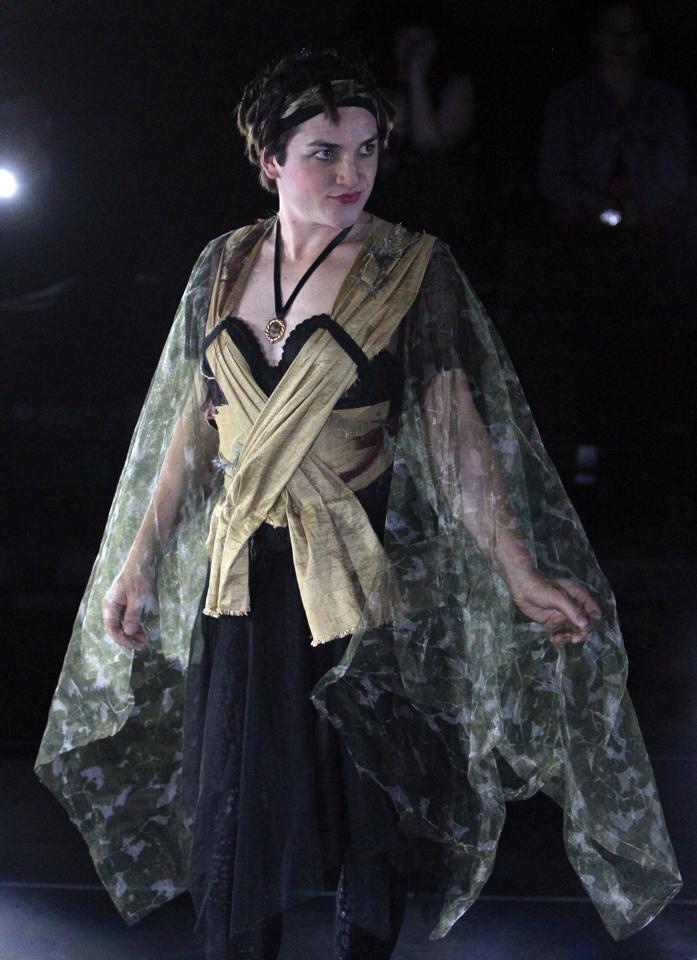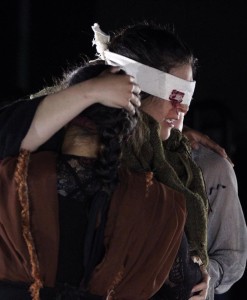
MILES AILEY AS THE SPHINX in “Kalos Kai Agathos,” showing at the Napa Valley Conservatory Theatre through Sunday.
Jeff Thomas photos
If you go, I recommend you refresh your knowledge of the classics to get the most from your experience. I didn’t, and I found it impossible to completely follow the story line. In addition to being presented in abstract form, the plot also takes leaps in time and place without any change in scenery or costume to distinguish them. Oh, did I mention the whole thing takes place in total darkness, except for low-lumen flashlights that are handed out at the door? Audiences are encouraged to use them to see their way to their seats, and to see the action on the stage.
“Kalos Kai Agathos,” or the grammatically condensed “Kalos kagathos,” is an ancient Greek phrase indicating an ideal of character, often used in a military context. A Wikipedia entry cites classicist W.W. Jaeger’s definition: “the chivalrous ideal of the complete human personality.” If you play with the etymology, you might also get “goodness begets righteousness.” The title’s connection to the substance of the play, though, was about as clear to me as the plot at Friday’s opening-night performance — though a little refresher on the Greek classics might resolve that issue as well.
Oedipus the king once saved his people from the curse of the sphinx by solving a bewildering riddle. He is portrayed as a powerful and insightful leader with a faithful following. He designates his two sons to be co-heirs to his throne, but while he is still living, both sons perish in a battle of ultimate sibling rivalry. He is left with two daughters, who help him to survive after he has cut out his own two eyes. Ultimately, Oedipus loses all, including his god-like reputation. These are the facts as I was able to glean them from the production.
There is certainly more to the story, but the rest, for me, was lost in the confusion of the play’s unconventional presentation. Since confusion is also a theme throughout the play, perhaps the intent is for audiences to feel that emotion first-hand as they watch.In the process of the telling, several hooded figures chant in the darkness, often repeating in unison such phrases as “The king is a murderer,” or “I’ll tell you the answer,” or the more obscure “I am hungry with a hunger older than me.” Players enter, exit and move among the audience from all four corners of the room, alternately chanting, whispering or singing. Written notes are plucked from among dozens suspended from the ceiling in various-shaped envelopes, read aloud as if the progress of the play could turn according to each actor’s random choice.
Audience members are asked to lend their cell phones so actors may play music with them or even make a phone call to another actor on the stage. At one point, an audio recording of someone describing obsessive-compulsive disorder is played while an actor seated on the floor quietly demonstrates repetitive motions.
Highlights of the program include impressive costuming for all players — kings, peasants, furies and other mythical figures — and a consistently powerful portrayal of the protagonist by Aisha Rivera. The multi-faceted presentation, while confusing, also lends an air of magic to the production.
“Kalos Kai Agathos” should be fun for students of drama or other enthusiasts of creative theater, especially those familiar with the classics. For the casual observer, though, the play is only somewhat informative and entertaining, interesting primarily for its avant-garde style and nontraditional format.
Go with a sense of adventure — and with the ancient tale of Oedipus fresh in your mind.
If You Go
“Kalos Kai Agathos” continues at the Napa Valley Performing Arts Center, 2277 Napa-Vallejo Highway, Napa through May 10. Tickets are $15 to $20 and are available by calling 707-256-7500 or online at napavalleytheater.org.
Elizabeth Warnimont is a freelance writer specializing in the performing arts. She is also a substitute teacher for the Benicia Unified School District.







Leave a Reply